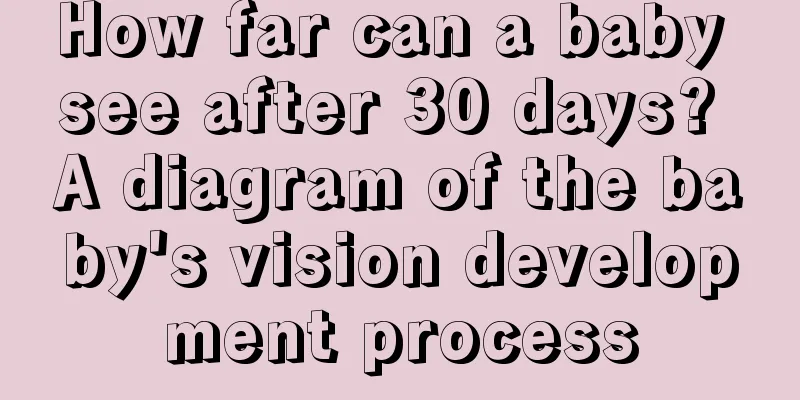How to judge whether a newborn baby is full? What are the signs that a newborn baby is full?

|
Many new parents have no way of judging whether their babies are full. If babies are not full, they will suffer from malnutrition. If babies eat too much, they will have weight problems. So how can new parents judge whether their babies are full? Here are some criteria for parents to judge. Let's learn according to the following criteria. Signs that your baby is fullFrequent spitting up Newborns will spit up milk when they eat too much, but it is not the usual spitting up caused by not burping, but frequent spitting up. Babies who are bottle-fed are most likely to be overfed. This is because bottle-fed parents will encourage their babies to eat more based on what they think their babies should eat. This can easily cause the baby to eat too much, have indigestion, and have milk curds when spitting up milk. diarrhea Another symptom of eating too much is diarrhea, because if the baby eats too much and cannot digest it, it is easy to hurt the stomach and intestines. Because the baby eats too much, the stomach and intestines are bloated, but the stomach continues to transport and digest food downward, so the stool is discharged from the body little by little, and diarrhea occurs. Crying Another sign that a newborn baby eats too much is crying. The baby's crying is not without reason, it is caused by discomfort in the lower abdomen, bloating or abdominal pain. What are the signs that your baby is hungry?The "I'm Hungry" Sign Signs that a baby is hungry include pouting, searching for the nipple with his mouth or nose, and burrowing into his mother's arms. Mothers can touch the baby's cheek with their fingers to test whether he is hungry. If the baby opens his mouth and turns his head to find your finger, it means he is really hungry and wants to feed. These symptoms are signs of being full1. See if your baby is satisfied Babies usually stop eating when they are full. If there is still milk in the baby's breast but the baby stops eating, it means that he is full. Or you can observe the baby's state after feeding, for example, if the baby does not cry after feeding, smiles at the mother, or falls asleep immediately, it means that the baby is full. 2. Check feeding time On average, a baby can swallow a large mouthful after every 2-3 sucks. If this continues for about 15 minutes, the baby will usually be full. 3. Look at the number of feedings Newborn babies should breastfeed frequently, usually every 1.5 to 3 hours, and on average 8 to 12 times a day. 4. Observe urination and defecation In the first two days after birth, the baby may only wet 1-2 diapers. Starting from the third or fourth day, he should have at least 6-8 wet cloth diapers (or 5-6 disposable diapers) every day. Breastfed babies have 4-5 bowel movements a day, which are generally golden and thick. |
Recommend
What to do if your baby is constipated after drinking milk powder? What milk powder should your baby drink without constipation?
Everyone should be familiar with milk powder. In ...
What should parents do if their child has appendicitis?
Appendicitis is the most common emergency in chil...
How long after giving birth can I practice Pilates? Pay attention to the intensity of exercise
Generally speaking, if you give birth naturally, ...
Why does a newborn baby sleep with his mouth open? Is it normal for a newborn baby to sleep with his mouth open?
Usually, many mothers are first-time mothers, so ...
Can pregnant women practice yoga? What are the benefits of pregnant women practicing yoga
Generally speaking, there are many taboos during ...
Does painless childbirth have any effect on the fetus? Does painless childbirth have any side effects?
In order to reduce the pain during childbirth, ma...
How to treat postpartum disease How to treat postpartum disease
It is a Chinese tradition that pregnant women sho...
Can babies use electric fans? At what age can babies use electric fans?
Electric fans are a must-have for cooling off in ...
What are the hazards of pregnant women stopping work and resting too early? The impact of pregnant women's anger on the fetus
During pregnancy, the hormone balance in the body...
How to care for cesarean section scars and postpartum scar repair methods
There are two most common ways for women to give ...
What foods should pregnant women not eat?
There are many things to pay attention to during ...
Can a flatulence patch be used on a newborn baby with flatulence? What kind of navel patch can be used on a newborn baby with flatulence?
Newborn bloating is a common phenomenon, mostly c...
Is it okay not to shave the baby's hair? When does the newborn's hair fall off?
Many parents will shave their baby's hair as ...
Does my husband need to check his sperm when preparing for a second child?
The opening of the two-child policy is conducive ...
Does hair dyeing affect pregnancy? What effects does hair dyeing have on pregnant women?
I believe everyone is also aware that hair dyes c...









